 Yamaha aerox NS50 - Owner's Manual > Replacing the fuse
Yamaha aerox NS50 - Owner's Manual > Replacing the fuse
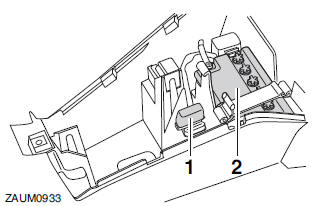
- Fuse
- Battery
The fuse holder is located behind panel A.
If the fuse is blown, replace it as follows.
1. Turn the key to " " and turn
off all
electrical circuits.
" and turn
off all
electrical circuits.
2. Remove the blown fuse, and then install a new fuse of the specified amperage. WARNING! Do not use a fuse of a higher amperage rating than recommended to avoid causing extensive damage to the electrical system and possibly a fire.
Specified fuse: 7.5 A
3. Turn the key to " " and turn
on
the electrical circuits to check if the
devices operate.
" and turn
on
the electrical circuits to check if the
devices operate.
4. If the fuse immediately blows again, have a Yamaha dealer check the electrical system.
Replacing the headlight bulb
If the headlight bulb burns out, replace it as follows.
NOTICE
Take care not to damage the following parts:
- Headlight bulb
Do not touch the glass part of the headlight bulb to keep it free from oil, otherwise the transparency of the glass, the luminosity of the bulb, and the bulb life will be adversely affected. Thoroughly clean off any dirt and fingerprints on the headlight bulb using a cloth moistened with alcohol or thinner.
- Headlight lens
Do not affix any type of tinted film or stickers to the headlight lens.
Do not use a headlight bulb of a wattage higher than specified.
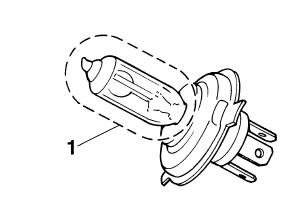
- Do not touch the glass part of the bulb.
NOTICE
It is advisable to have a Yamaha dealer perform this job.
1. Place the scooter on the centerstand.
2. Remove cowling A.
3. Disconnect the headlight coupler.
4. Remove the headlight bulb cover.
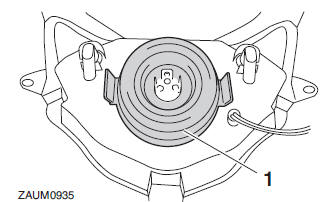
- Headlight bulb cover
5. Unhook the headlight bulb holder, and then remove the burnt-out bulb.
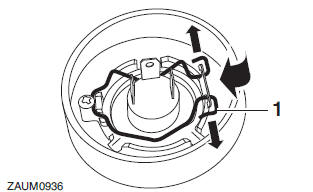
- Headlight bulb holder
6. Place a new headlight bulb into position, and then secure it with the bulb holder.
7. Install the headlight bulb cover.
8. Connect the headlight coupler.
9. Install the cowling.
10. Have a Yamaha dealer adjust the headlight beam if necessary.
Replacing the tail/brake light bulb
1. Remove the tail/brake light lens by removing the screws.
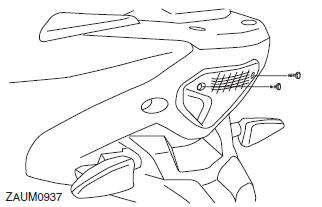
2. Remove the burnt-out bulb by pushing it in and turning it counterclockwise.
3. Insert a new bulb into the socket, push it in, and then turn it clockwise until it stops.
4. Install the lens by installing the screws.
NOTICE: Do not overtighten the screws, otherwise the lens may break.
Replacing a turn signal light bulb
1. Remove the turn signal light lens by removing the screw.
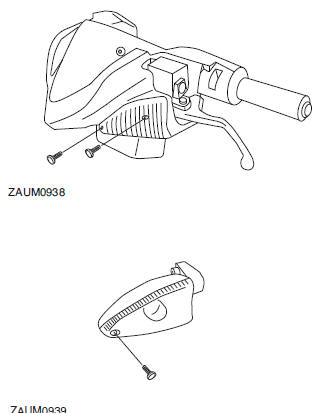
2. Remove the burnt-out bulb by pushing it in and turning it counterclockwise.
3. Insert a new bulb into the socket, push it in, and then turn it clockwise until it stops.
4. Install the lens by installing the screw.
NOTICE: Do not overtighten the screw, otherwise the lens may break.
License plate light
If the license plate light does not come on, have a Yamaha dealer check the electrical circuit or replace the bulb.
Replacing the auxiliary light bulb (if equipped)
If the auxiliary light bulb burns out, replace it as follows.
1. Place the vehicle on the centerstand.
2. Remove cowling A.
3. Remove the auxiliary light bulb socket (together with the bulb) by pulling it out.
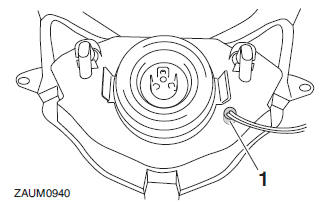
- Auxiliary light bulb socket
4. Remove the burnt-out bulb by pulling it out.
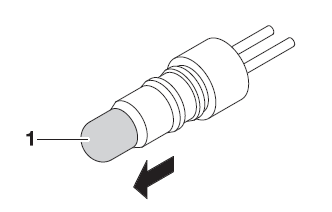
- Auxiliary light bulb
5. Insert a new bulb into the socket.
6. Install the socket (together with the bulb) by pushing it in.
7. Install the cowling.
Troubleshooting
Although Yamaha scooters receive a thorough inspection before shipment from the factory, trouble may occur during operation. Any problem in the fuel, compression, or ignition systems, for example, can cause poor starting and loss of power.
The following troubleshooting charts represent quick and easy procedures for checking these vital systems yourself.
However, should your scooter require any repair, take it to a Yamaha dealer, whose skilled technicians have the necessary tools, experience, and know-how to service the scooter properly.
Use only genuine Yamaha replacement parts. Imitation parts may look like Yamaha parts, but they are often inferior, have a shorter service life and can lead to expensive repair bills.
WARNING
When checking the fuel system, do not smoke, and make sure there are no open flames or sparks in the area, including pilot lights from water heaters or furnaces. Gasoline or gasoline vapors can ignite or explode, causing severe injury or property damage.
Troubleshooting charts
Starting problems or poor engine performance
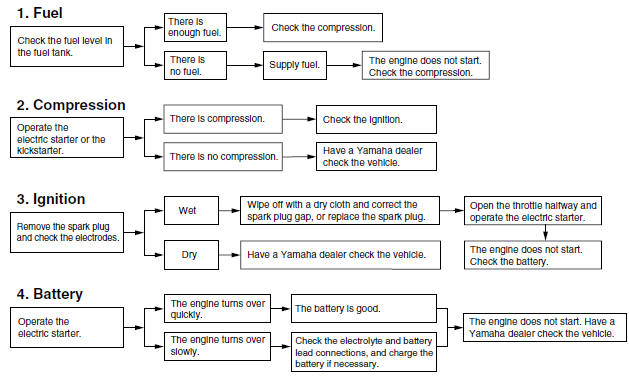
Engine overheating
WARNING
- Do not remove the radiator cap when the engine and radiator are hot. Scalding hot fluid and steam may be blown out under pressure, which could cause serious injury. Be sure to wait until the engine has cooled.
- After removing the radiator cap retaining bolt, place a thick rag, like a towel, over the radiator cap, and then slowly rotate the cap counterclockwise to the detent to allow any residual pressure to escape. When the hissing sound has stopped, press down on the cap while turning it counterclockwise, and then remove the cap.

TIP
If coolant is not available, tap water can be temporarily used instead, provided that it is changed to the recommended coolant as soon as possible.
See also:
 Yamaha aerox NS50 - Owner's Manual > Checking the front and rear brake pads
Yamaha aerox NS50 - Owner's Manual > Checking the front and rear brake pads
The front and rear brake pads must be checked for wear at the intervals specified in the periodic maintenance and lubrication chart. Front brake pads Brake pad wear indicator groove
 BMW R 1250 RT
BMW R 1250 RT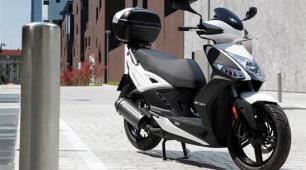 Kymco Agility 50
Kymco Agility 50 Piaggio Liberty 50
Piaggio Liberty 50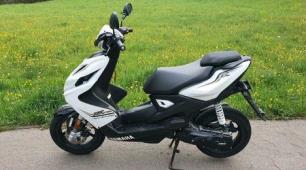 Yamaha aerox NS50
Yamaha aerox NS50 Aprilia SR50R
Aprilia SR50R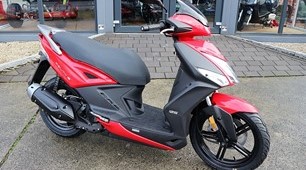 Kymco Agility 50
Kymco Agility 50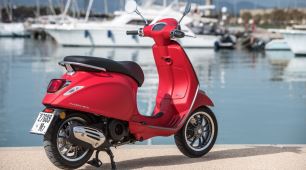 Vespa Primavera 50
Vespa Primavera 50 Peugeot Speedfight
Peugeot Speedfight